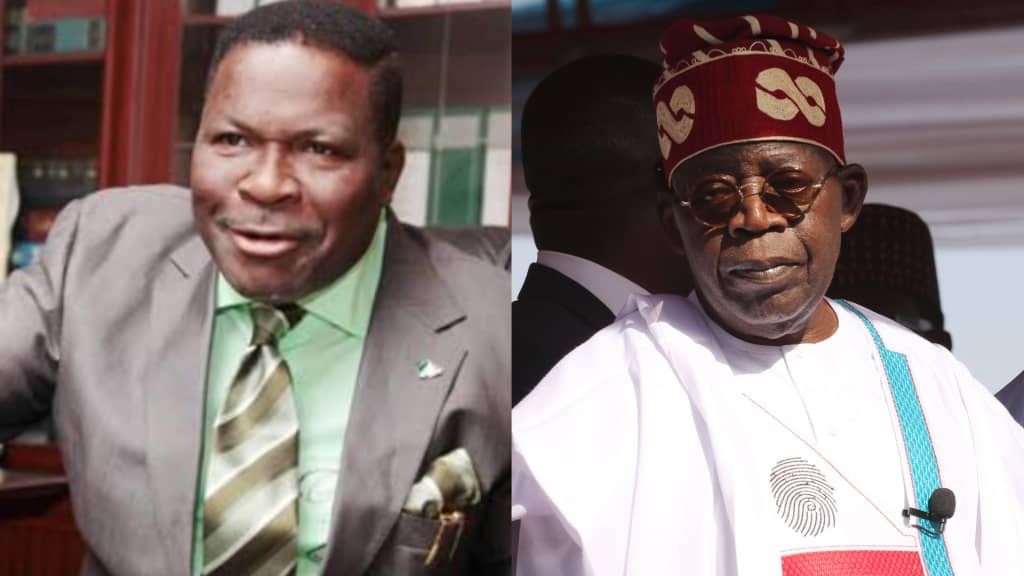Headlines
Ozekhome: Tinubu Needs Political Will for New Nigerian Constitution

Mike Ozekhome, a Senior Advocate of Nigeria (SAN), has called on President Bola Tinubu to exhibit the necessary political courage in procuring an inclusive constitution for Africa’s most populous nation.
As a member of The Patriots, a group comprising distinguished Nigerians led by former Commonwealth Secretary-General Chief Emeka Anyaoku who had an audience with the President at the State House in Abuja on Friday, the human rights lawyer appeared as a guest on Channels Television’s Sunday Politics program.
When questioned about the President’s commitment to actualizing a new constitution, the experienced attorney responded by stating that it is imperative for him to possess political resolve. She emphasized that persistent issues cannot be resolved until they are confronted directly.
When asked if a fresh constitution could cure poverty, insecurity and other issues afflicting Nigeria, Ozekhome replied that it certainly can. He explained how the present-day dilemmas such as corruption, destitution and various killings are all signs of an underlying issue which requires immediate solutions. Once this fundamental predicament is resolved adequately then addressing subsequent obstacles would fall into place accordingly.
According to Ozekhome, the Nigerian constitution of 1999 was enforced by the military and did not undergo any referendum. He believes that Nigeria requires a homegrown document centered on its people to steer it away from its aimless voyage.
He stated that Nigeria does not have a sense of national identity. “As a country, we still long for nationhood and are lacking in unity,” he explained. He further suggested that the new constitution should be put to the vote of the public through a referendum.
When questioned about the necessity of Nigeria forming a constituents’ assembly prior to drafting a new constitution, the senior advocate replied that only with such an assembly and approval from the National Assembly could legislation be passed. Once this is achieved, Mr President may sign off on the draft constitution thus enabling its formal adoption.
“If the people agree on having a unicameral legislature,” he stated, “it shall be so because democracy is determined by their will.”
“Nigerian State Engine Fails”
According to Ozekhome, the Nigerian state’s constitution represents a faulty engine that requires replacement.
The agreement of the political elite is necessary. If your car’s engine isn’t functioning correctly, wouldn’t you attend to it first? Instead of fixing up or enhancing other aspects like painting and tires, which won’t help in moving the vehicle forward.
For the moment, I am affirming that the Nigerian state’s engine is malfunctioning and causing a proliferation of mutual distrust and religious intolerance.
According to him, while economic reforms are beneficial, they should not take priority over a constitution that prioritizes the people. For Nigeria to overcome its challenges, he asserted that there must be consensus in the National Assembly on adopting a new constitution.
Following the 2014 National Conference Report, which proposed a variety of actions including constitutional amendments, community policing, fiscal federalism and restructuring amongst others; Ozekhome provided commentary.
A conference was organized a decade ago by then President Goodluck Jonathan and other leaders to provide practical recommendations on how the country can progress.
On March 17, 2014, the national conversation was initiated under the stewardship of Justice Idris Kutigi (retd.), a highly esteemed jurist.
For a period of approximately five months, the conference was attended by 494 individuals hailing from diverse backgrounds in Nigeria. The cost of this event amounted to roughly N10bn and resulted in over 600 recommendations being proposed. These proposals encompassed adjustments geared towards restructuring Nigeria’s political, economic, social as well as security systems with an aim to abate grievances originating from various geopolitical regions within the country while simultaneously promoting prolonged peacefulness.
Despite the confab’s recommendations, successive administrations have failed to implement them.
